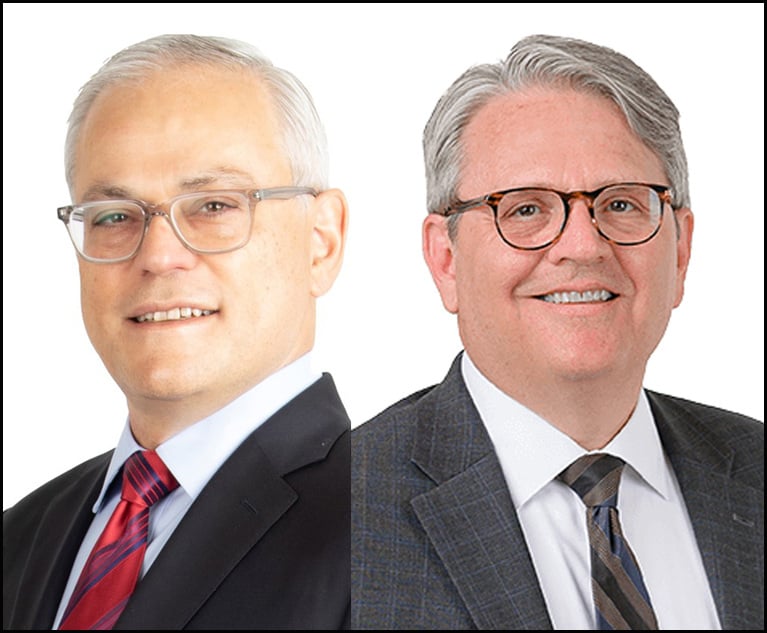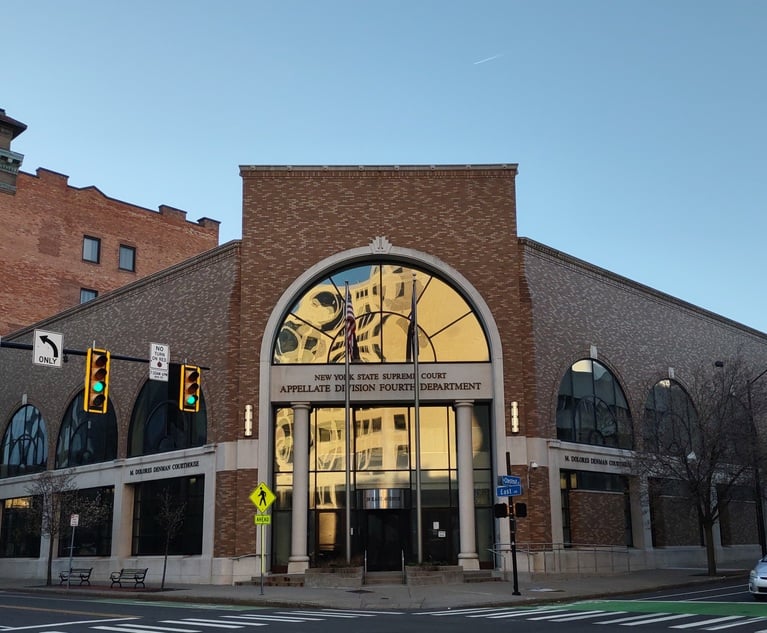Design Firm Must Turn Over Documents Related to Confidential, Settled Sexual Harassment Case
The judge faced the question of whether a settlement agreement's confidentiality provision can seal off evidence of past actions by a company that are potentially relevant to a new harassment claim.
December 01, 2017 at 11:30 AM
7 minute read

A world-renowned design firm, embroiled in current litigation, must turn over in discovery documents related to a past employee's settled discrimination claims, despite its argument that the information should remain shielded by the confidential settlement agreement it reached with the employee, a Manhattan federal judge has ruled.
Southern District Magistrate Judge Barbara Moses has found against defendant Despont Studios on two related discovery issues in a lengthy opinion that also cited Rule 5.6(a)(2) of the New York Rules of Professional Conduct as a reason to turn back Despont's argument that a plaintiffs-side law firm, which represented Despont employees in both the past lawsuit and current suit, may not use discovery documents tied to the past employee's settled claims.
Despont, represented by Ingram Yuzek Gainen Carroll & Bertolotti, had argued that Manhattan-based plaintiffs firm Wigdor was restricted by the combination of a confidentiality clause found in the former client's settlement agreement, coupled with a settlement agreement provision that made the agreement “binding on employer and employee and upon their respective heirs, representatives, successors, and assigns.”
“If the generic term 'representatives' … were meant to bind litigation counsel to every substantive provision in the Moore [Settlement] Agreement, absurd results would follow,” Moses wrote. She added that “facts suggest that the parties did not intend the term 'representatives' to mean their litigation counsel, at least not when acting on behalf of a different client.”
The opinion from Moses delves into a topic that has made headlines, and engendered widespread debate, in recent weeks as reports of legal strategies used by alleged sexual predators such as Harvey Weinstein have emerged: When should confidentiality and nondisclosure agreements be allowed to silence allegations and evidence of harassment or abuse or, perhaps, more gravely, patterns of such predation.
Moses faced the related wrinkle of whether such agreements can seal off evidence of past actions by a company that are potentially relevant to a newly brought harassment claim.
In Sunaz v. Despont Studios, 17cv1979, Moses requested supplemental briefing on a discovery issue that arose in a suit filed by Trinity Sunaz, a former housekeeper in the Manhattan offices of Despont Studios, the noted firm of French designer Thierry Despont that, among other projects, restored the Statue of Liberty.
In her federal action, Sunaz claims she was sexually harassed, groped, discriminated against and constructively discharged while working at the firm, which she maintains lacked any legitimate mechanism for addressing and remedying employee complaints.
The issue before Moses was whether Despont could rightfully withhold from discovery in the Sunaz suit documents related to former associate architect Dominique Moore's past complaints of pregnancy discrimination at Despont and the firm's response to those complaints.
On Nov. 14, Moses had ordered Despont to generally produce documents concerning past complaints of harassment or discrimination and its response to such complaints. But Moses made an exception for documents related to Moore's settled claims. The judge asked that each party first brief (1) whether Sunaz was entitled to documents concerning Moore's claims, and (2) whether Wigdor, having represented Moore, may use Moore-related documents on behalf of its client, Sunaz.
In a Nov. 28 opinion, the judge ruled yes to both questions, siding with Sunaz and Wigdor and knocking back Despont's arguments.
In addressing the initial issue—whether Sunaz was entitled to the Moore documents—she first pointed out that Despont had asserted the Faragher/Ellerth defense, which refers to case law set forth in Faragher v. Boca Raton, 524 U.S. 775 (1998), and Burlington Indus. v. Ellerth, 524 U.S. 742 (1998). Under the defense, an employer carries the burden of showing that it exercised reasonable care to stop and promptly correct sexual harassment, and that the employee unreasonably failed to use such preventive or corrective opportunities, Moses said.
The judge then wrote, “Defendant … has clearly asserted the Faragher/Ellerth defense. Plaintiff is therefore entitled to discovery concerning the existence and effectiveness of the 'preventive or corrective opportunities' that [Despont] provided.”
“In light of [Despont]'s relatively small size [about 50 employees in Manhattan] and apparent informality, the Court has already held that the permissible discovery includes documents concerning past complaints of harassment and discrimination, and [Despont]'s response,” she further wrote, adding, “To the extent documents concerning Ms. Moore fall within the scope of my November 14, 2017 Order, they are not rendered immune from discovery by Ms. Sunaz merely because [Despont] obtained a confidentiality promise from Ms. Moore when it settled her lawsuit. Ms. Sunaz has not asked Ms. Moore to produce any documents. She seeks discovery from [Despont] itself, which is not burdened by any contractual confidentiality obligation.”
In regard to the issue of Wigdor's ability to seek out and use Moore-related information on behalf of its new client, Moses pointed out that Despont “has never argued … that Wigdor is prohibited from representing any and all plaintiffs in litigation against it.”
“These facts suggest that the parties did not intend the term 'representatives' to mean their litigation counsel, at least not when acting on behalf of a different client,” she wrote.
Moses also said that “even if the language of the Agreement were more susceptible of the interpretation [Despont] now champions, this Court would hesitate to construe it as restricting Wigdor from representing other clients against [Despont], because any such contract would violate Rule 5.6(a)(2) of the New York Rules of Professional Conduct … [which] states that a lawyer 'shall not participate in offering or making … an agreement in which a restriction on a lawyer's right to practice is part of the settlement of a client controversy.'”
“It is well-settled that this rule prohibits a lawyer from entering into an agreement that prevents her from representing future clients against the same opposing party,” Moses added. “Given a choice, the federal courts generally decline to construe settlement agreements in a manner that brings them into tension with Rule 5.6,” she also said.
David Gottlieb, a Wigdor partner representing Sunaz, said on Thursday that “one takeaway” of the issue before Moses is that “there is a lot of focus these days on nondisclosure agreements in connection with settlement of claims, and this goes to show that another potential ramification of such nondisclosures is that not only is the victim silenced, but companies will use these provisions to try to shield themselves from liability in other cases.”
“Evidence of a pattern of misconduct should not be threatened to be buried by virtue of a confidentiality agreement,” he said, “when it could be highly relevant to other people's claims.”
He also pointed to “the larger issue of coming after plaintiff's counsel, [as] here what they [Despont's lawyers] were effectively trying to do was exclude us” from serving as Sunaz's lawyers.
“The Rules of Professional Conduct are clear that attorneys cannot be limited or restricted in the way they practice law,” he said.
But Robert Banner, counsel for Despont and a partner at Ingram Yuzek, said “the office of Thierry Despont has nothing to hide. It settled a matter to avoid the cost of discovery and depositions, and it thought, by settling, both sides had put those issues behind it.”
“I think what it does—and we argued this—is it reduces the incentive to settle cases,” he said of Moses' ruling.
“We're disappointed,” Banner added, “but if we have to go through and litigate the [Moore] issues, and the court says that they are relevant to the instant claim, OK. We think that the facts as set forth in the Moore pleadings will actually be very beneficial to defending the Sunaz suit.”
“We're not trying to limit Wigdor practicing law,” he said, “but if they found out information from Ms. Moore, and if they use that information in talking to Ms. Sunaz, we think we won't be able to learn that, because of attorney-client privilege, and that is prejudicial to us in representing Despont.”
This content has been archived. It is available through our partners, LexisNexis® and Bloomberg Law.
To view this content, please continue to their sites.
Not a Lexis Subscriber?
Subscribe Now
Not a Bloomberg Law Subscriber?
Subscribe Now
NOT FOR REPRINT
© 2024 ALM Global, LLC, All Rights Reserved. Request academic re-use from www.copyright.com. All other uses, submit a request to [email protected]. For more information visit Asset & Logo Licensing.
You Might Like
View All


The American Disabilities Act, Sovereign Immunity and Individual Liability
7 minute read
NY High Court Returns Fired Priest's Discrimination Claim to State Agency
Trending Stories
Who Got The Work
Michael G. Bongiorno, Andrew Scott Dulberg and Elizabeth E. Driscoll from Wilmer Cutler Pickering Hale and Dorr have stepped in to represent Symbotic Inc., an A.I.-enabled technology platform that focuses on increasing supply chain efficiency, and other defendants in a pending shareholder derivative lawsuit. The case, filed Oct. 2 in Massachusetts District Court by the Brown Law Firm on behalf of Stephen Austen, accuses certain officers and directors of misleading investors in regard to Symbotic's potential for margin growth by failing to disclose that the company was not equipped to timely deploy its systems or manage expenses through project delays. The case, assigned to U.S. District Judge Nathaniel M. Gorton, is 1:24-cv-12522, Austen v. Cohen et al.
Who Got The Work
Edmund Polubinski and Marie Killmond of Davis Polk & Wardwell have entered appearances for data platform software development company MongoDB and other defendants in a pending shareholder derivative lawsuit. The action, filed Oct. 7 in New York Southern District Court by the Brown Law Firm, accuses the company's directors and/or officers of falsely expressing confidence in the company’s restructuring of its sales incentive plan and downplaying the severity of decreases in its upfront commitments. The case is 1:24-cv-07594, Roy v. Ittycheria et al.
Who Got The Work
Amy O. Bruchs and Kurt F. Ellison of Michael Best & Friedrich have entered appearances for Epic Systems Corp. in a pending employment discrimination lawsuit. The suit was filed Sept. 7 in Wisconsin Western District Court by Levine Eisberner LLC and Siri & Glimstad on behalf of a project manager who claims that he was wrongfully terminated after applying for a religious exemption to the defendant's COVID-19 vaccine mandate. The case, assigned to U.S. Magistrate Judge Anita Marie Boor, is 3:24-cv-00630, Secker, Nathan v. Epic Systems Corporation.
Who Got The Work
David X. Sullivan, Thomas J. Finn and Gregory A. Hall from McCarter & English have entered appearances for Sunrun Installation Services in a pending civil rights lawsuit. The complaint was filed Sept. 4 in Connecticut District Court by attorney Robert M. Berke on behalf of former employee George Edward Steins, who was arrested and charged with employing an unregistered home improvement salesperson. The complaint alleges that had Sunrun informed the Connecticut Department of Consumer Protection that the plaintiff's employment had ended in 2017 and that he no longer held Sunrun's home improvement contractor license, he would not have been hit with charges, which were dismissed in May 2024. The case, assigned to U.S. District Judge Jeffrey A. Meyer, is 3:24-cv-01423, Steins v. Sunrun, Inc. et al.
Who Got The Work
Greenberg Traurig shareholder Joshua L. Raskin has entered an appearance for boohoo.com UK Ltd. in a pending patent infringement lawsuit. The suit, filed Sept. 3 in Texas Eastern District Court by Rozier Hardt McDonough on behalf of Alto Dynamics, asserts five patents related to an online shopping platform. The case, assigned to U.S. District Judge Rodney Gilstrap, is 2:24-cv-00719, Alto Dynamics, LLC v. boohoo.com UK Limited.
Featured Firms
Law Offices of Gary Martin Hays & Associates, P.C.
(470) 294-1674
Law Offices of Mark E. Salomone
(857) 444-6468
Smith & Hassler
(713) 739-1250






